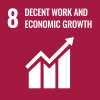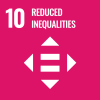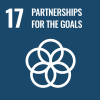There are now an estimated 258 million people living in a country other than their country of birth — an increase of 49% since 2000 — according to new figures released by UN DESA today, on International Migrants Day. The International Migration Report 2017 (Highlights), a biennial publication of the department, states that 3.4% of the world’s inhabitants today are international migrants. This reflects a modest increase from a value of 2.8% in 2000. By contrast, the number of migrants as a fraction of the population residing in high-income countries rose from 9.6% in 2000 to 14% in 2017.
The report reviews the latest migration trends, assesses the demographic contribution of migration, examines the status of ratification of relevant conventions and summarizes recent developments on migration at the United Nations. The data presented in the report are based on national statistics, obtained from population censuses as well as population registers and nationally representative surveys.
International migration is a critical concern for the implementation of the 2030 Agenda for Sustainable Development. On 19 September 2016, the General Assembly adopted the New York Declaration for Refugees and Migrants, in which UN Member States agreed to implement well-managed migration policies. They also committed to sharing more equitably the burden and responsibility for hosting and supporting the world’s refugees, protecting the human rights of all migrants, and countering xenophobia and intolerance directed towards migrants. An international conference on migration will be convened in late 2018 for the purpose of adopting a Global Compact for Safe, Orderly and Regular Migration.
“Reliable data and evidence are critical to combat misperceptions about migration and to inform migration policies”, observed Mr. Liu Zhenmin, UN DESA’s Under-Secretary-General. “These new estimates of numbers of international migrants around the world will provide an important baseline for Member States as they begin their negotiations on the Global Compact for Safe, Orderly and Regular Migration.”
The report shows that international migration makes an important contribution to population growth in many parts of the world and even reverses population decline in some countries or areas. Between 2000 and 2015, migration contributed 42% of the population growth in Northern America and 31% in Oceania. In Europe, the size of the total population would have declined during the period 2000-2015 in the absence of migration.
In 2017, around three quarters (74%) of all international migrants were of working age, or between 20 and 64 years of age, compared to 57% of the global population. Because international migrants comprise a larger proportion of working-age persons compared to the overall population, a net inflow of migrants lowers the dependency ratio, that is, the number of children and older persons compared to those of working age.
In Africa, Asia, and Latin America and the Caribbean, the net impact of migration on population growth is negative in most countries but typically small compared to other population changes. In some small developing countries, however, the negative impact of outmigration on the size of the population can be substantial, especially among adults of working age.
Trends in international migration
In 2017, high-income countries hosted 64%, or nearly 165 million, of the total number of international migrants worldwide. Moreover, most of the growth in the global population of international migrants has been caused by movements toward high-income countries, which host 64 million of the 85 million migrants added since 2000.
The number of international migrants includes 26 million refugees or asylum seekers, or about 10% of the total. Although a majority of the world’s international migrants live in high-income countries, low- and middle-income countries host nearly 22 million, or 84%, of all refugees and asylum seekers.
There has been a global increase in the median age of migrants, from 38.0 years in 2000 to 39.2 years in 2017. However, in some regions, such as Asia, Oceania and especially Latin America and the Caribbean, the median age of migrants has decreased by about three years.
In 2017, 48.4% of international migrants were women. Female migrants outnumber males in all regions except Africa and Asia; in some countries of Asia, male migrants outnumber females by about three to one.
In 2017, two thirds of all international migrants were living in just twenty countries, and half of all international migrants were residing in just ten countries. The largest number of international migrants (49.8 million, or 19% of the global total) reside in the United States. Saudi Arabia, Germany and the Russian Federation host the second, third and fourth largest numbers of migrants worldwide (around 12 million each), followed by the United Kingdom (nearly 9 million).
Destination and origin of international migrants
More than six of every ten international migrants reside in Asia or Europe (80 and 78 million, respectively). Northern America hosts the third largest number (58 million), followed by Africa (25 million), Latin America and the Caribbean (9.5 million) and Oceania (8.4 million).
These migration patterns are consistent with the growth seen during the period 2000 – 2017, when Asia added some 30 million migrants, followed by Europe, which added 22 million, Northern America, 17 million, and Africa, 10 million.
In most countries of Europe, Northern America and Oceania, international migrants comprised more than 10% of the total population in 2017.
In 2017, Asia and Europe were the regions of origin for the largest numbers of international migrants — 106 million and 61 million, respectively. Latin America and the Caribbean followed with 38 million and Africa with 36 million.
Between 2000 and 2017, Africa experienced the largest relative increase in the number of international migrants who had originated in that region (+68%), followed by Asia (+62%), Latin America and the Caribbean (+52%) and Oceania (+51%).
India has the largest number of persons born in the country who are now living outside its borders. The number of Indian-born persons residing abroad numbered 17 million in 2017, ahead of the number of Mexican-born persons living outside Mexico (13 million). The Russian Federation, China, Bangladesh, Syrian Arab Republic and Pakistan and Ukraine also have large migrant populations living abroad, ranging from 6 to 11 million each.
 Welcome to the United Nations
Welcome to the United Nations


